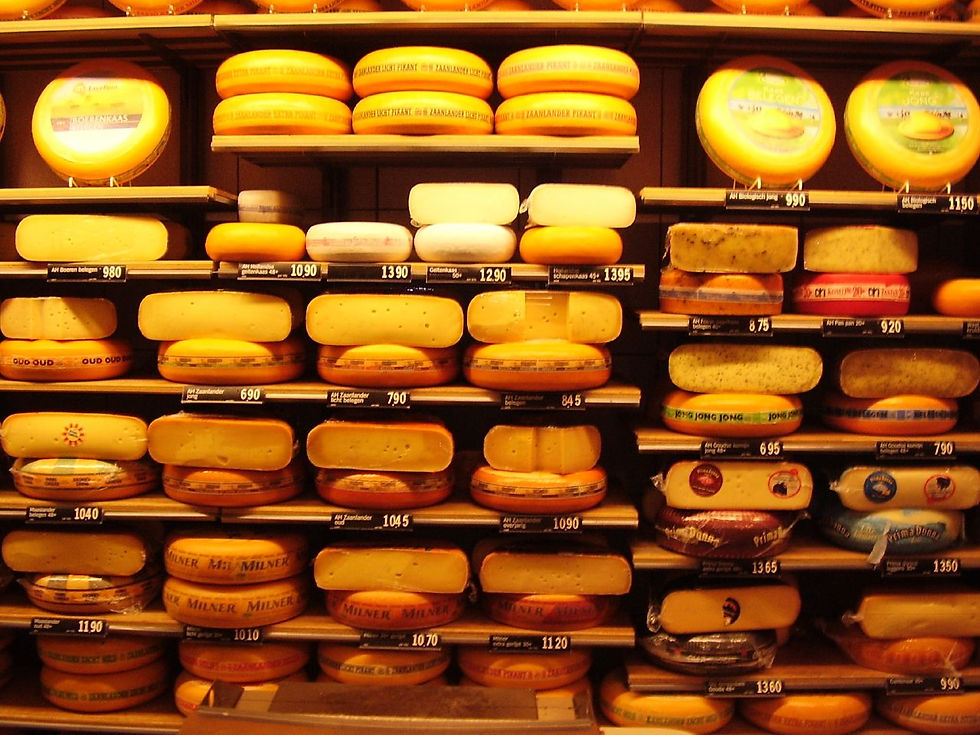Why the USDA Shouldn't Be Buying Up Surplus Cheese
- OurStudio

- Aug 27, 2016
- 3 min read

shelleylyn / CC BY-SA
On Monday, Politico reported that farm "lobbyists have been laboring for months" to try to secure tens of millions of dollars in federal aid for their members, who are struggling thanks to a combination of overproduction and low commodity prices.
We're "pushing both Congress and the USDA to assist producers," said Zack Clark, a lobbyist for the National Farmers Union, to Politico.
In addition to the NFU, those who've been shaking cups in the nation's capital include lobbyists from the American Farm Bureau and the National Milk Producers Federation. The aid they've sought centers on increasing the amount of wheat present in shipments of foreign food aid, expanding loans to farmers, and getting more cash in the hands of dairy producers.
By Tuesday, aid for dairy farmers was already a done deal. All that vigorous cup-shaking had turned into $20 million in USDA purchases of surplus cheese. That's on top of the $11 million in additional support for dairy producers the USDA announced earlier this month.
"That's mad cheese," writes the Arizona Republic's Louie Villalobos.
Mad cheese. And madness.
This news is as awful as it is timely. In fact, it's practically ripped out of the pages of my book, Biting the Hands that Feed Us: How Fewer, Smarter Laws Would Make Our Food System More Sustainable, which is being published on September 15. (Pre-order here!)
In Chapter 2, "'Big Food' Bigger Thanks to 'Big Government,'" I recount the many ways the government generally—and, often, the USDA specifically—wrongly aids and abets large-scale food producers. Examples include USDA farm subsidies, marketing orders, and checkoff programs. But the USDA's habitual purchase of excessive animal agriculture products is one key misuse of agency funds that's often underreported.
Yet for foods like milk that are subject to a tangled web of USDA rules that seek to promote and manage supply and demand, begging for a handout from the USDA in times of low prices or excess supply (or, as now, both) has become the norm. And that begging is often rewarded.
Still, it would be unfair to single out the dairy industry.
"In 2011, for example, the USDA purchased $40 million of excess poultry in an effort to aid large poultry producers," I write in Biting the Hands that Feed Us. "Two years earlier, the agency bought up a similar amount of pork 'to boost America's hog farmers.' […] In fact, the USDA regularly spends millions of dollars each year to prop up animal agriculture producers. In 2009, according to the Physicians Committee for Responsible Medicine, a pro-vegan group, the USDA spent more than $1.7 billion to buy surplus dairy, beef, eggs, pork, and poultry. Paul Shapiro, vice president for farm animal welfare with the Humane Society of the United States, told me those industries often try to keep government at arm's length, but when they 'suffer from lack of demand, their clamor for government aid is stark.'"
Shapiro's words are echoed by Daren Bakst, a research fellow in agricultural policy with the Heritage Foundation.
"Unlike for other businesses, existing policy seeks to protect farmers from market forces, such as lower prices," said Bakst, in an email to me this week. "When the failed and overgenerous policies aren't generous enough, agriculture lobbies come looking for more taxpayer dollars."
CNN, reporting on the USDA's use of taxpayer funds to buy up some of what it referred to as our "massive cheese stockpile," attributed the cause of our oversupply of cheese to "[i]ncreased milk inventories, higher European exports, low prices, sluggish demand and shifting consumption habits."
In any normal industry, certainly any one in which the free market is given even lip service, these factors would signal producers about the need to change:
Shit. We made too many widgets, and people aren't buying them even at the lower prices we're forced to charge because we made too many widgets? Well, it's time to make fewer widgets, or diversify, or innovate, or all of the above.
"If there wasn't this federal government intervention in the first place that distorts production decisions," says Bakst, "price signals would inform farmers whether to produce more or less of a commodity, which would help to address overproduction."
Who got taxpayers, consumers, and farmers into this mess? Congress, the USDA, many farmers, and the big farm lobbies are all to blame.
More importantly, who can get us out of this mess? Expecting those same farm lobbies, Congress, and USDA bureaucrats to break the wheel is a fool's errand.
Instead, voters and courts may hold the key. But consider, too, that when leading minds at disparate groups like the Heritage Foundation and the Humane Society of the United States agree on an issue like this—and offer the same critique—there exists not just the potential but the grounds for real change.




Comments